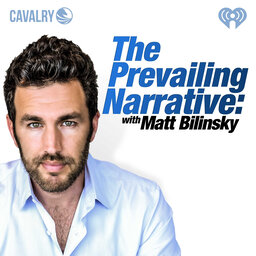Episode 27: Soros DA Chesa Boudin Gets Bounced; Washington Post Descends Into Chaos; Russia Update and Gas Prices Hit Record High; Peter Navarro Arrested & Man Tries to Assassinate Justice Kavanaugh
0:57 - Radical Progressive District Attorney Chesa Boudin is recalled in a landslide. What does mean for the "criminal justice reform" movement? Was it all a fraud?
15:37 - Washington Post descends into a civil war over reporter Dave Weigel RT'ing a stupid joke....and resident witch Felicia Somnez having a week-long tantrum.
24:09 - The Russian military seems to be consolidating wins while the US goes into month 4 of record gas prices. Is our bet on Ukraine paying off?
35:59 - Former guest Peter Navarro is arrested for defying Jan 6th committee subpoena, and a man is arrested with weapons near the home of Justice Bret Kavanaugh...and the media doesn't seem too interested.
In 1 playlist(s)
The Prevailing Narrative with Matt Bilinsky
A lively and fiercely analytical breakdown of news and current events, with interviews of thought le…Follow podcast
Recent clips

Episode 30: "Dark Plots & Secret Explanations": Study Rejects "Chemical Imbalance" as Cause of Depression (Max Lugavere Discusses); Biden & His Media Surrogates Re-Define "Recession; Kansas Abortion Ruling; Zelensky Poses for Vogue(?!); Public Health Lies on Monkeypox
1:38:34

Episode 29: Kamal Ravikant - Silicon Valley Thought-Leader, Investor, & Bestselling Author on Loving Yourself, Stepping Past Fear, Extreme Sharing, Investing Skills, and Living a Life of Honesty, Adventure and Authenticity
1:12:12

Episode 28: Political Scientist Wilfred Reilly on Gun Control, Targeted Solutions, and the Facts and Myths About Gun Violence in America; Nihilism and Mass Shootings
1:44:29
 The Prevailing Narrative with Matt Bilinsky
The Prevailing Narrative with Matt Bilinsky